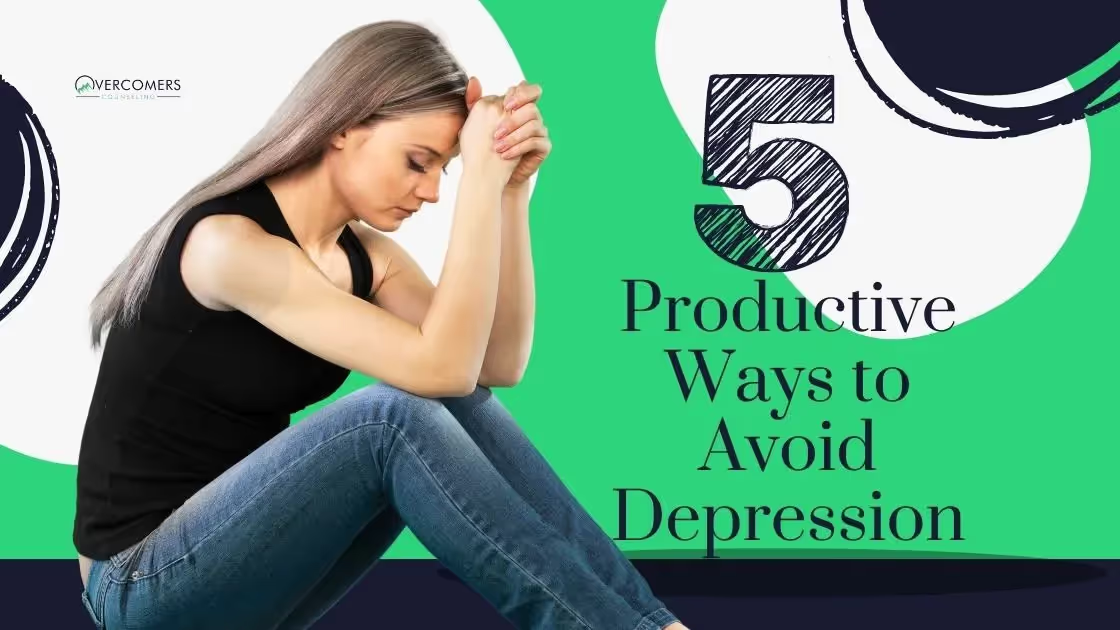Depression can occur to anyone at any age, and when it happens, it may be caused by a family history of depression, the effects of a physical illness,...

Depression can occur to anyone at any age, and when it happens, it may be caused by a family history of depression, the effects of a physical illness, trauma from a stressful event, the use of certain medications; thus, it's essential that you learn ways to avoid depression to reduce the risk of having depression.
One way to avoid depression is to ensure your meals are healthy and devoid of processed ingredients; therefore, you should strive to eat whole grains, fresh vegetables, and soybean products and avoid red meat, trans fat, sodas, and sugary desserts.
Accumulated stress in the body can cause depression, and one of the sure ways to avoid depression is to avoid stress by taking adequate breaks from your work, learning to reject additional work, and knowing how to balance your free time with expectations properly.
Similarly, you can avoid depression by taking your sleep seriously, as insomnia can cause depression quickly; hence, you should try to sleep well by going to bed early every day, making your room a comfortable temperature before you sleep, and avoiding large meals before bedtime.
You can consider these productive ways to avoid depression:
Although no known meal has been scientifically proven to avoid depression, eating some healthy foods will infuse your body with valuable nutrients that can help boost your mood and mental strength.
Consuming foods with antioxidants is one of the ways to avoid depression because antioxidants reduce the negative effect that free radicals can have on your body, which includes aging, depression, and cell damage; therefore, eating foods such as broccoli, blueberries, and vegetable oils can help you avoid depression.
Also, eating smart carbs can give your body energy and give your brain a mind-boosting effect due to serotonin in the foods; thus, you should try to eat whole grains, fruits, legumes, and vegetables to boost your mood.
You may equally add proteins into your diet because of the presence of tryptophan, an amino acid that makes serotonin, and you can easily get this nutrient from turkey, chicken, tuna, lean beef, milk, fish, poultry, beans, and yogurt.
Everyone experiences stress regularly, but your stress may cause depression, especially when you don't manage it well and leave it to keep accumulating till it begins to cause mental problems for you, such as depression.
When you feel stressed, you should try to understand that it's causing you a problem because if you keep seeing its effects as everyday occurrences, you won't be so moved to change the status quo; thus, you should make a connection between your physical fatigue and the stress you are undergoing.
Then, you should try to identify the causes of the stress in your life and categorize them into those that you can deal with and those that time will deal with; this categorization will aid you in focusing your energy on the ones that can be solved while not bothering about the others.
To tackle those that can be solved, think about the things you are involved in and analyze how much work you are doing, how you can reduce the work, and ways to prevent such stressful work from creeping up on you again.
Sleeping well is one of the ways to avoid depression because your brain shuts down, heals your stressed neural pathways, and allows your mind to stop worrying; hence, you should take this method seriously.
To enable your body to sleep well, you should cultivate a good sleep environment for yourself by making the temperature of your room even for you, using dark curtains to prevent external light into your room, and switching off the internal lights.
It's also crucial that you avoid the intake of food, alcohol, or caffeine right before your bedtime as food can cause stomach upset that won't let you sleep, alcohol can cause some disturbed sleep, and caffeine can prevent you from getting any sleep.
You can also take a shower before your bedtime, as this will help you de-stress, relax, and get your body into a calm state, allowing you to sleep quickly because your body temperature and brain activities have been lowered.

Exercise as a facilitator of good mental health can help you gain confidence in yourself as you smash fitness goal after goal; getting into a great shape after completing certain challenges can also help you build your self-confidence.
As one of the ways to avoid depression, exercise helps by giving you a chance to interact with other people, thus enabling you to exchange greetings, exercise pointers, or even numbers with people and boost your mood in the process.
Exercise also serves as a great way to cope with anxiety as it gives you good feelings throughout, from lifting heavy weights and completing hectic challenges to changing your body shape to your desired body goal.
To begin exercising, you can go to a gym or engage in home workouts; as long as you can use your muscles, sweat a little, and use up your energy, you are already exercising, and you don't need a structured regimen to begin.
Therapy helps prevent many mental conditions, and it's also one of the ways to avoid depression because it involves you talking about the feelings that relate to depression and helping you find methods that can prevent the depression from taking root in you.
When using therapy as one of the ways to avoid depression, you can consider individual therapy, which consists of only you and the therapist, enabling you to talk about your feelings without fear of getting judged by other people.
Also, you may consider family therapy which helps you put your family in the mix to support you during the therapy sessions and enable the therapist to observe how your behavior affects your loved ones.
Furthermore, you may choose group therapy, where you are placed in a support group containing people with similar issues led by a therapist who moderates the conversation and pushes everyone to help everyone else with their coping methods.
Living with depression may be challenging, and treating it may also be expensive; therefore, it's beneficial to learn ways to avoid depression, such as eating healthy foods, avoiding stress, sleeping well, exercising, and using therapy.
https://www.webmd.com/depression/guide/diet-recovery
https://www.mentalhealth.org.uk/publications/how-manage-and-reduce-stress
https://www.sleepfoundation.org/sleep-hygiene/how-to-relieve-stress-for-bedtime
https://www.medicalnewstoday.com/articles/320502#avoid-stress
https://www.verywellmind.com/types-of-psychotherapy-for-depression-1067407
Yes! In fact, it's encouraged that you open up to your therapist so they can gain deeper insight into your individual situation and develop the most effective treatment plan possible that works best for you. Your therapist is there to serve as an unbiased source of support who will respect any thoughts or feelings shared within the session without judgment or criticism.
Ignoring depression can exacerbate symptoms and make it more challenging to manage over time. This can result in a negative impact on your personal, professional, and social life, leading to feelings of isolation and even thoughts of self-harm or suicide.
There are many helpful resources available, including support groups, online forums, books and websites dedicated to mental health and wellness. Connecting with other people struggling with the same issue can be especially beneficial. Additionally, talking to a trusted friend or family member can provide much-needed social support during difficult times.
The duration of depression counseling varies for each individual, depending on the severity of their depression and their progress in therapy. Our therapists will regularly assess your progress and adjust your treatment plan as needed.
While medication is not always required for managing depression, it can be beneficial in some cases. If you decide that medication is right for you, medications such as antidepressants work by balancing certain brain chemicals involved in regulating moods. Other options include mood stabilizers or antipsychotic drugs which may also prove helpful for certain individuals struggling with symptoms of depression.
Depression is a mental disorder (a common one) that affects millions of people worldwide. It is characterized by persistent feelings of sadness, hopelessness, and loss of interest in activities once enjoyed.In this section, we will discuss the various types of depression, including major depressive disorder, persistent depressive disorder, and bipolar disorder.Gaining a deeper understanding of your depression is the first step in finding the right treatment and support.